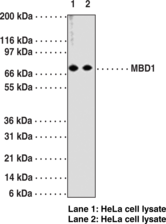| References |
| Synonyms |
|
| Formulation |
100 µg of protein G-purified IgG in 0.2 ml PBS containing 0.2% gelatin and 0.05% sodium azide. |
| Stability |
1 year |
| Storage |
-20°C |
| Shipping |
Wet ice
in continental US; may vary elsewhere
|
| Specificity |
|
Background Reading
Bhattacharya, S.K., Ramchandani, S., Cervoni, N., et al. A mammalian protein with specific demethylase activity for mCpG DNA. Nature 397 579-583 (1999).
Hendrich, B., and Bird, A. Identification and characterization of a family of mammalian methyl-CpG binding proteins. Mol Cell Biol 18(11) 6538-6547 (1998).
Bader, S., Walker, M., and Harrison, D. Most microsatellite unstable sporadic colorectal carcinomas carry MBD4 mutations. Br J Cancer 83(12) 1646-1649 (2000).
Petronzelli, F., Riccio, A., Markham, G.D., et al. Biphasic kinetics of the human DNA repair protein MED1 (MBD4), a mismatch-specific DNA N-glycosylase. J Biol Chem 275(42) 32422-32429 (2000).
Show all 4
Hide all but first 3
| Size |
Global Purchasing |
| 1 ea |
|
Description
Antigen:
synthetic peptide corresponding to human MBD1 amino acids 391-405
·
Clone designation:
100B272.1
·
Host:
mouse
·
Isotype:
IgG1
·
Application(s):
WB
·
DNA methylation, or the addition of methyl groups to cytosine bases in the dinucleotide CpG, is imperative to proper development and regulates gene expression. The methylation pattern involves the enzymatic processes of methylation and demethylation. The demethylation enzyme was recently found to be a mammalian protein, which exhibits demethylase activity associated to a methyl-CpG-binding domain (MBD).1 The enzyme is able to revert methylated cytosine bases to cytosines within the particular dinucleotide sequence mdCpdG by catalyzing the cleaving of the methyl group as methanol. MeCP2 and MBD1 (PCM1) repress transcription by binding specifically to methylated DNA.2 MBD2 and MBD4 (also known as MED1) colocalize with foci of heavily methylated satellite DNA and mediate the biological functions of the methylation signal. Surprisingly, MBD3 does not bind methylated DNA either in vivo and in vitro. MBD1, MBD2, MBD3, and MBD4 are expressed in somatic tissues, but the expression of MBD1 and MBD2 is reduced or absent in embryonic stem cells, which are known to be deficient in MeCP1 activity. MBD4 has homology to bacterial base excision repair DNA N-glycosylases/lyases.3 In some microsatellite unstable tumors MBD4 is mutated at an exonic polynucleotide tract.4
1
Bhattacharya, S.K., Ramchandani, S., Cervoni, N., et al. A mammalian protein with specific demethylase activity for mCpG DNA. Nature 397 579-583 (1999).
2
Hendrich, B., and Bird, A. Identification and characterization of a family of mammalian methyl-CpG binding proteins. Mol Cell Biol 18(11) 6538-6547 (1998).
3
Petronzelli, F., Riccio, A., Markham, G.D., et al. Biphasic kinetics of the human DNA repair protein MED1 (MBD4), a mismatch-specific DNA N-glycosylase. J Biol Chem 275(42) 32422-32429 (2000).
4
Bader, S., Walker, M., and Harrison, D. Most microsatellite unstable sporadic colorectal carcinomas carry MBD4 mutations. Br J Cancer 83(12) 1646-1649 (2000).
|






